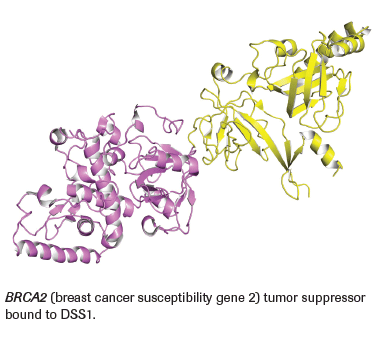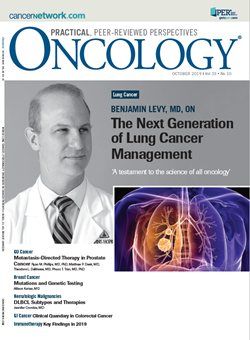Mutations and the Importance of Genetic Testing
Dr. Allison W. Kurian discusses a new breast cancer study that analyzed the mutations present in breast tumors, and about emerging targeted therapy options.
Allison W. Kurian, MD


There is some controversy over whether every single woman with breast cancer shold have genetic testing, or whether it should only those who have some personal or family history that would suggest their breast cancer may be linked to an inherited mutation. There are also tests of the tumor that look for somatic mutations. Here, we explore the arguments and options.
Advancing towards personalized medicine in breast and ovarian cancers
Recently, ONCOLOGY spoke with primary study author Dr. Allison W. Kurian about a new breast cancer study that analyzed the mutations present in breast tumors, and about emerging targeted therapy options. Dr. Kurian is associate professor of medicine and oncology and health research and policy at the Stanford University Medical Center in California. Her clinical practice focuses on women at high risk for developing breast and gynecologic tumors and treating women who are diagnosed with breast cancer. She is also director of the Stanford Women’s Clinical Cancer Genetics Program.
Q: First, what are the standard genetic tests the vast majority of women who are diagnosed with breast cancer undergo or should undergo? Do these tests assay for both somatic and germline mutations?
Dr. Kurian: This is a great question. I would say the answer is still specific to the kind or stage of breast cancer a woman has. A great number of women now qualify under existing guidelines for testing for inherited genetic mutations. Examples of that would be testing for the BRCA1 and BRCA2 mutations. There is some controversy over whether that should be every single woman with breast cancer or only those who have some personal or family history that would suggest their breast cancer may be linked to an inherited mutation. There are also tests of the tumor that look for somatic mutations. Right now, somatic mutation tests are typically reserved for those women with advanced metastatic disease, but there are some early gene expression tests such as the Oncotype DX® (21-gene test) we often use.
Q: You see women who are, compared to the general population of women, at higher risk for breast and ovarian cancers. How do these women typically find a clinician such as yourself? Do they know they carry a cancer susceptibility mutation because someone in their family has been diagnosed with breast cancer or a gynecologic cancer?
Dr. Kurian: The patients I see tend to be a mix. At the Stanford Women’s Clinical Cancer Genetics Program, which is similar to many cancer genetics clinics around the country, we see people because they are referred for their own personal cancer diagnosis. This is often because they had a breast cancer diagnosis at a young age or a breast cancer diagnosis with family history or ovarian cancer. For these patients, we might do a genetic test and find an inherited genetic mutation. If we do, then we might ask them to reach out to their relatives and have them tested. Other times, maybe the relative with cancer has been tested somewhere else and her unaffected relative might find us for genetic testing and recommendations about how to manage cancer risk.
Q: You and your colleagues recently conducted this study survey examining genetic testing among women diagnosed with breast or ovarian cancers.[1] Can you tell us about the study design and what prompted you to do this?
Dr. Kurian: Absolutely. The study design is based in the largest and highest-quality population-based cancer registry in the United States, which is the SEER [Surveillance, Epidemiology, and End Results] registry. The SEER registry covers about one-third of the US population in terms of recording (cancer diagnosis), survival, and other outcomes of patients. We were very interested in looking across the whole population, so not just people being seen at academic centers like Stanford University but everyone, and understanding what happened in terms of genetic testing. What we were able to do was to look at the large populations of the states of California and Georgia, which together add up to 50 million people. We were able to use the SEER registry from both states that covers the whole population. This means that we did not leave anyone out. We then were able to do a data linkage, which was really exciting and innovative. We worked together with the four major testing laboratories that provide genetic testing to link the genetic data to the cancer registry data. Thus, we were able to learn a great deal about who actually gets tested and what was found.
Q: What did your study find that was particularly surprising to you?
Dr. Kurian: The study had a number of interesting results. Probably the most striking one was that only less than one-third of patients with ovarian cancer ever got genetic testing.[1] For more than 10 years, there have been guidelines from a number of different societies, from cancer societies to obstetrics and gynecology societies, that say everyone with (the standard kind of) ovarian cancer––high-grade serous ovarian cancer––should get genetic testing. So, to see that it was fewer than 30% was really concerning in terms of under-testing. Now, our analysis was based on data gathered from 2013 to 2014 and this figure may have improved in more recent years. Those years, however, were times when it was very clear that everyone needed to be tested. I think that under-testing is of concern. We did see that was more of a problem in African American women and women without insurance. So, there are certainly issues there that we saw in this study.
Q: So about this under-testing, are there potentially obvious reasons for this and is it something that you and your colleagues are looking at further?
Dr. Kurian: I think it’s an important question, and I don’t know exactly why there was this under-testing trend. When we see a difference of disparity by ethnic characteristics, insurance, and socioeconomic status, we think about access barriers in terms of whether some people are getting less effective care or have clinicians who maybe don’t understand that they need to refer them for genetic testing. Or could this be a situation in which patients have other barriers? They may be dealing with a lot other than cancer treatment and doing one more thing like a genetic test is just too much. It was interesting that we didn’t see these problems with breast cancer, only with ovarian cancer. It does suggest a particular area to target. We are actually in the process of applying for funding to do a much more focused study of ovarian cancer patients to try to understand why this might be and how we might fix it.
Q: Anything else in general to add on this topic, including any advice for clinicians who see patients with breast and ovarian cancer, and anything else on the specific vulnerable populations that you identified?
Dr. Kurian: Ovarian cancer patients need genetic testing, period. This is straightforward and it’s something where again, as we see that there seems to be under-testing in women with less insurance and women of African American ethnicity, there needs to be particular care that those patients are appropriately counseled and tested and referred to specialists and geneticists as needed.
Q: Could you talk about the growing therapeutic options specific for breast cancer based on genetic mutations that have been uncovered? Are there now novel targets that are being explored in clinical trials or that may be tested in clinical trials soon?
Dr. Kurian: Yes. It’s been an exciting several years in this breast cancer therapeutics space. When I started in the field in 2002, we really didn’t have any targeted therapy related to inherited gene mutations. Over the last several years, we have seen the development of PARP [poly (ADP-ribose) polymerase] inhibitors, which are drugs that can be very effective in treating ovarian cancer in women who have an inherited genetic mutation. These drugs also sometimes work in women who don’t have a genetic mutation, but they seem to be particularly effective if women have an inherited genetic mutation. More recently, PARP inhibitors have also been approved for treatment of breast cancer in women who have an inherited genetic mutation. It’s more relevant than ever before to understand what the genetic testing results are in terms of guiding treatment of cancer. And there are a number of other clinical trials ongoing also focused on these questions. Some of these clinical trials are combining PARP inhibitors with immunotherapy, which we’re excited to learn more about and seem promising.
Q: Anything else you would like to mention about either therapy or genetic testing for breast cancer patients?
Dr. Kurian: This is an interesting and exciting time to live in, in terms of the practice of medicine and oncology. A lot of the promise of genetics and genomics is just being unlocked. I think there’s great importance both in pursuing the bench science and clinical science side of things in terms of clinical trials and understanding which mutations might be targetable. But there is also a huge need to work on the population sciences and implementation side, which is really thinking about how do we use genetic testing, how do we make sure people get this testing, and how do we make sure that the results are acted on and managed appropriately.
Key Question
For this type of genetic testing, are there any hurdles logistically for these women as far as getting the testing done?
Dr. Kurian: It has been interesting as the cost of genetic testing has fallen dramatically over the last 5 or 6 years. It used to be that to get the most clinically relevant genes, BRCA1 and BRCA2, tested could cost more than $3,000. It really was difficult for a number of people, and although insurance covered it, insurance companies were relatively stringent about whom they would cover to get the testing done. Now, however, it is inexpensive. The testing has dropped down to a cost of maybe $200 out of pocket to get a large panel of genes tested if insurance does not pay. I still wish it were $5 or no cost, but $200 becomes much more attainable and often insurance does pay. So, the barriers in terms of costs are much less than they used to be. A lot of the time, however, we have barriers related to what is understood by the clinicians who are seeing these patients and whether it is realized that it is important to refer women who have early-onset breast cancer, breast cancer with a family history, or ovarian cancers to have appropriate genetic counseling and testing.
Disclosure:Dr. Kurian has received research funding from Myriad Genetics.
PERSPECTIVE

Important Research, Next Steps
Banu Arun, MD
The authors of this study have provided us with an important snapshot of the frequency of genetic testing in a population-based cohort of breast and ovarian cancer patients, including a subpopulation analysis in the United States. This study provides important information, helping to build a foundation of the current state of genetic testing in these cancer patients in order for clinicians and geneticists to identify the issues and gaps with regard to genetic testing. The study showed that the frequency of genetic testing is fairly low for both breast and ovarian cancer patients and is even lower for those women without insurance. The work also underscored the racial disparity that exists as the frequency black and Hispanic women who underwent genetic testing was lower compared to the frequency of white women that were tested. This study is a step towards first identifying the populations that are underserved when it comes to genetic testing and second, implementing strategies to improve the frequency of genetic testing in the clinic. While the study focused on data from populations in Georgia and California, future studies should analyze whether testing patterns are similar in other United States geographies, particularly in the southwest. Next, we need to understand why the racial disparities exist and identify approaches that can be implemented to improve genetic testing across the United States for women with breast and ovarian cancers.
Dr. Arun conducts research characterizing risk factors in high-risk women with or without hereditary breast cancer mutations and assessing breast cancer biology in patients with breast cancer who have mutations of the BRCA1 or BRCA2 gene. She also runs clinical treatment trials in patients with BRCA mutations using PARP inhibitors.
FINANCIAL DISCLOSURE: Dr. Arun has received research funding from Invitae.
Dr. Arun is Professor in the Department of Breast Medical Oncology, Division of Cancer Medicine, and Co-Medical Director, Clinical Cancer Genetics Program, University of Texas MD Anderson Cancer Center, Houston, Texas.
References:
1. Kurian AW, Ward KC, Howlader N, et al. Genetic testing and results in a population-based cohort of breast cancer patients and ovarian cancer patients. J Clin Oncol. 2019;37:1305-1315.
